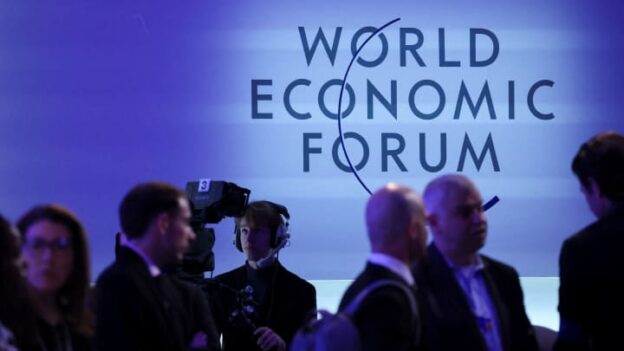- The World Economic Forum’s Annual Meeting takes place in Davos from 20-24 January 2025.
- Here’s a snapshot of everything you need to know about Day 3 of Davos 2025.
On the second day of the World Economic Forum’s Annual Meeting in Davos, here’s a rundown of what happened, the key sessions to watch, essential reading, live coverage of the session highlights and snippets of some of the conversations in the corridors.
Things you might have missed
We heard from global leaders yesterday on AI, energy, the future of growth, global health and more. In the morning, Ursula von der Leyen, President of the European Commission said “from AI to clean tech, from quantum to space… the race is on” – and indeed, a number of discussions addressed the geopolitics of tech. World conflicts were also highly discussed, with strong will expressed for diplomacy and cooperation.
You can read more highlights from Day 2 in our round-up below, re-watch sessions on the website, or check out our coverage across social media.
Sessions to watch today
All times below are in GMT+1.
Women have made remarkable strides in political representation in the past decade, but there’s still a long way to go. Europol’s Executive Director, Catherine De Bolle, François Valérian, Chair of Transparency International, Democratic Republic of the Congo’s Minister of State, Thérèse Kayikwamba Wagner, and Alicia Bárcena Ibarra, Mexico’s Secretary of Environment and Natural Resources, discuss how this persistent gap can be tackled.
The IMF’s First Deputy Managing Director, Gita Gopinath, joined McKinsey Global Managing Partner, Bob Sternfels and leaders from business and politics to discuss how government and industry can collaborate to better mobilize capital for resilience-building investments.
Odile Françoise Renaud-Basso, President, European Bank for Reconstruction and Development (EBRD) said the bank was helping emerging markets plan for the longer term, while Gopinath remarked on how surprisingly resilient emerging economies have been over recent years.
Governance in Latin America is being transformed. Polarized politics, increasing demands for security and challenging migration flows are among the factors impacting government effectiveness and the public’s expectations. Peruvian President, Dina Ercilia Boluarte, joins the President of Panama, José Raúl Mulino, and the President of the Inter-American Development Bank, Ilan Goldfajn, discussed how the region’s leaders are navigating these risks.
Commenting on the Panama Canal – which is in the spotlight following US President Trump’s comments in his inaugural address – President Mulino said, “the Panama Canal belongs to Panama” and encouraged respect for international protocols. He also highlighted the strength of Panama’s allyship with the US.

Prime Minister Ibrahim highlighted the critical importance and urgency of the Paris Agreement and other climate agreements and reinforced the importance of cooperation with neighbouring countries.
Watch this session with leading economists from around the world to discuss the emerging economic landscape and the decisions for business and policy-makers in 2025 and beyond.
How can we place high-quality employment at the heart of future economic policy, especially at a time when nearly a quarter of jobs are exposed to disruption? President of Singapore, Tharman Shanmugaratnam, joins Gilbert Fossoun Houngbo, Director-General of the International Labour Organization (ILO), LinkedIn CEO, Ryan Roslansky, Denis Machuel, CEO, Adecco Group, and Veronica Nilsson General Secretary, Trade Union Advisory Committee (TUAC) to the OECD, to discuss.
Catch up on the key quotes in the X thread below.
https://www.weforum.org/stories/2025/01/day-3-davos-2025-what-to-know/?utm_source=sfmc&utm_medium=email&utm_campaign=2845760_Wednesday22January2025-ForumStoriesDailyAm25&utm_term=&emailType=Forum%20Stories







